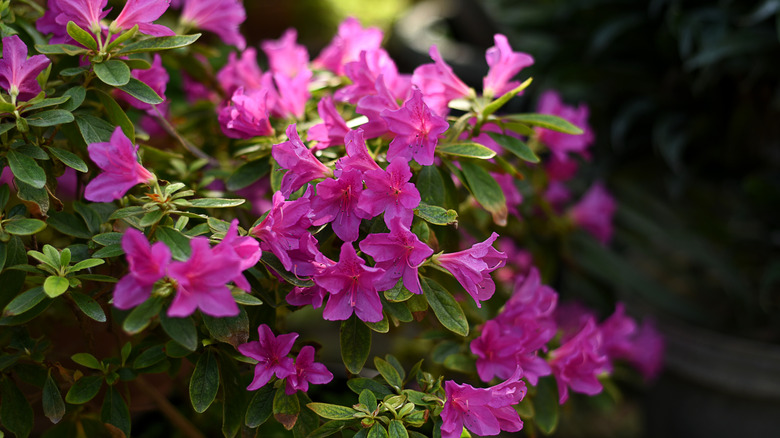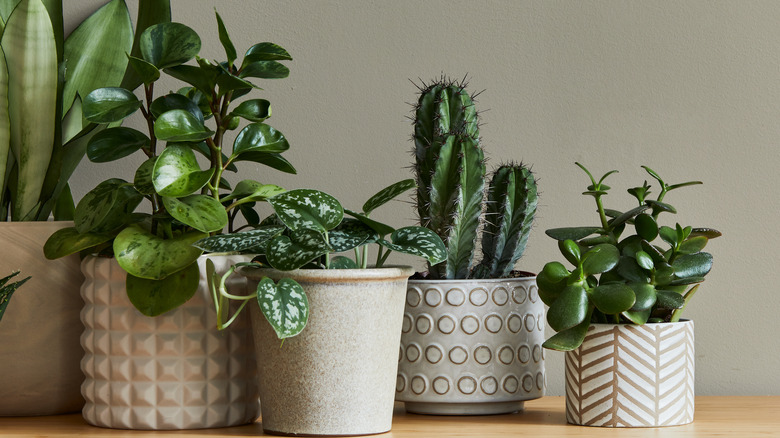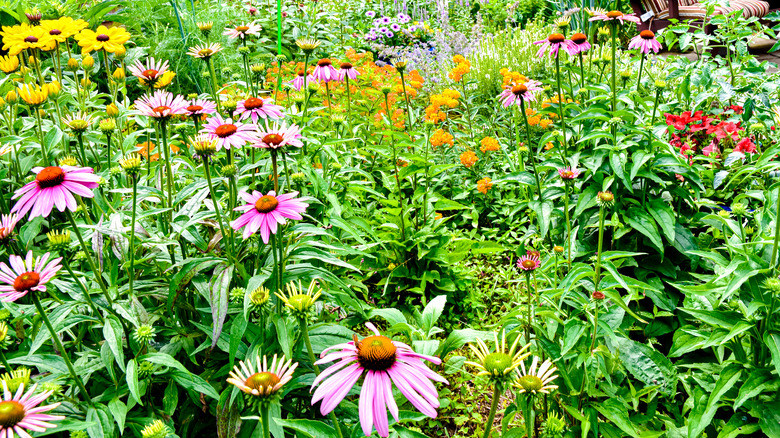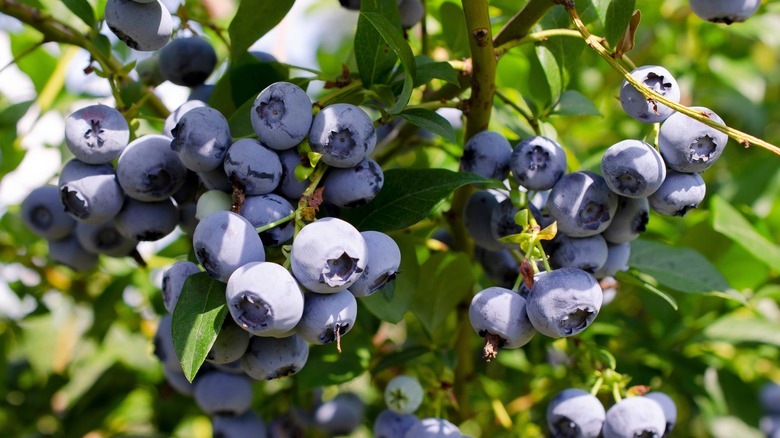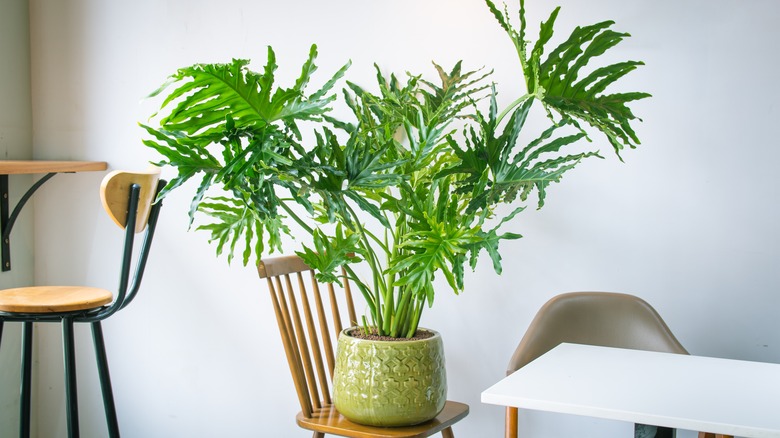Plants That Don't Need Epsom Salt In Your Garden
Most home gardeners have heard about the miracles of Epsom salt and how it can do wonders for plants with magnesium deficiencies. But unfortunately, it's also not a one-size-fits-all approach. There are some plant types, like succulents, tropical greens, azaleas, blueberries, and native plants, that aren't exactly fans of Epsom salt. That's because too much magnesium can actually disrupt the pH of the soil, as well as slow down the plant's ability to absorb calcium.
Succulents and tropical plants are kind of like the chill dudes at the plant party. They don't need a lot of fancy nutrients, and too much magnesium can be a bit much for their tastes. It's like ordering a massive pizza when they just wanted a slice. So instead of dowsing with Epsom salt, opt for a slow-release fertilizer that will give them their nutrients in small, manageable doses.
Azaleas and blueberries are like the gourmet foodies of the plant world. They love soil to be slightly acidic, and Epsom salts can really mess with slightly acidic soil, throwing off the pH. For these two plant gourmands, it's best to stick to specialized acid-loving plant fertilizers. Lastly, native plants are like the locals who know the neighborhood inside out and prefer their soil au naturel, so keeping their substrate free from anything is the most suitable way to keep them happy. The bottom line is to keep it simple, and your green buddies will thank you.
Azaleas
Azaleas have got it all figured out because they naturally love soil that's a tad on the acidic side and already packed with organic goodness. Epsom salt adds not just extra magnesium, but also sulfur, which can be a lifesaver for some plants with nutrient problems. But not azaleas. If you go overboard with Epsom salt, you could mess with the pH balance and throw things off-kilter, which isn't great for these flower beauties. So, instead of reaching for the Epsom salt, stick to what azaleas like best, which is staying in that slightly acidic comfort zone.
Make sure that the soil is well-draining, because this is a shrub that doesn't like having wet feet. Be sure to check its pH every so often and use plant food specially made for them. Toss in some mulch around the base of the plant, which will keep the soil temperature consistent and also preserve moisture.
Succulents and cacti
Succulents and cacti are like the tough, independent cowboys of the plant world. They've evolved to survive in places where nutrients are as rare as a desert rainstorm. Which is exactly why they don't need Epsom salt. It's like bringing a super expensive bottle of champagne to a Wild West saloon.
As previously mentioned, Epsom salt mainly delivers magnesium and sulfur, which are like the fancy toppings on a pizza. But succulents and cacti are all about living lean. They've mastered the art of sipping water wisely and can tough it out in low-nutrient soils. When you throw Epsom salt into their gritty world, it messes with their natural balance and can stress them out. So, if you're tending to succulents or cacti, give them well-draining soil and don't drown them with water. Give them little sips, not gulps, and let the soil dry out completely between drinks. They're not big fans of heavy meals, so don't go crazy with the fertilizer. They only need a snack every once in a while.
Native plants
Native plants have been around for a long time, and are well suited to growing and adapting in their own natural environments. They've become masters of their local soil, and know exactly what they need to grow healthy and strong. When you introduce Epsom salt into their soil, it can disrupt the nutrient balance that they've come to rely on, and this disruption can lead to a variety of problems. Instead of helping them, it might actually harm their growth and overall well-being.
The smart move is to let these native plants enjoy their familiar surroundings. Avoid introducing any type of soil amendments, like Epsom salt, or making any significant changes to their growing conditions. Stick to providing them with the conditions they're used to, and they'll continue to thrive just as they have for generations. It's all about letting them do their thing, in their own natural way.
Blueberries
Blueberries are a great, albeit slow-growing, addition to your outdoor garden zone. They're like the long-lasting gems you want to keep around and can continue producing anywhere from 40 to 50 years. Just like azaleas, they're picky about their soil, and that's a big deal for their health and productivity. Blueberries love well-draining soil with a slightly acidic vibe, which is crucial, and it helps their roots grab essential nutrients like iron and manganese, which can be a bit shy in alkaline soil.
Because Epsom salt is all about magnesium, it can make the soil more alkaline, which blueberries do not like. In alkaline soil, your beloved shrub will struggle to get the nutrients it craves. This can manifest as yellow leaves, burn marks, stunted growth, and unfortunately, fewer tasty berries. So, if you're thinking of using Epsom salt, keep it in check, and don't toss it around your blueberry bushes. Keep them happy in their slightly acidic playground.
Tropical palms
Tropical plants include but aren't limited to fiddle leaf figs, monstera, and philodendron. Spraying Epsom salt on them, which some indoor gardeners do, can be a bit much. Instead of overwhelming your plant with the magnesium from Epsom salt, it's smarter to go for a slow-release fertilizer that you mix into the soil twice a year. Think of it as serving them smaller, more manageable portions of their nutrients. Look for fertilizers that have less phosphorus and more potassium and nitrogen. It's like a better mix for most tropical plants, and it'll give them a nudge to bloom. That being said, some plants do have a hankering for more phosphorus to put on a flower show, so check their preferences.
Chances are that if you're using a good soil mix, all the necessary minerals are probably already in there. Just remember to toss them some compost and the occasional natural, organic fertilizer, and they'll be in growth mode like a champ. Remember that moderation and balance are the secret sauce to keeping your tropical plants happy and thriving.

